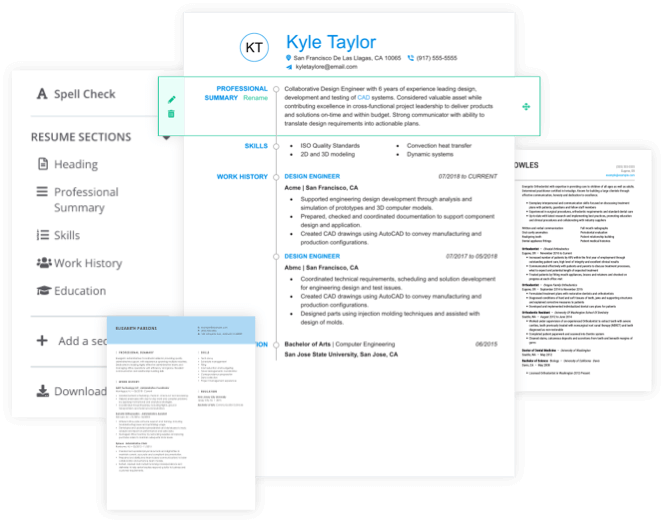- Featured in:

Places that deal with large quantities of stock, such as warehouses and retail outlets, hire inventory clerks to keep track of what comes in and goes out. Their efforts ensure an accurate picture of what’s on hand and where it’s located. While inventory clerks tend to work standard business hours, facilities that operate around the clock hire people for night and weekend shifts too. Experienced inventory clerks often go on to careers as inventory control specialists, supply chain planners, production schedulers, or warehouse managers.
Studying resume examples is a great way to get inspiration for your own. Study our library of example today!
One extra step to impress a manager: A growing number of hiring professionals read cover letters to determine whether they’ll interview a candidate or not. Use our cover letter templates to craft a complete application that lands you the interview.
Inventory Clerk Duties and Responsibilities
Daily activities of inventory clerks vary by employer needs, but our evaluation of job postings revealed some core tasks central to the position, including the following:
Maintain Inventory Counts
Companies must carefully keep track of what moves in and out of their facilities. Accurate counts ensure merchandise is available to fill customer demands. Likewise, knowing where things stand in terms of raw materials and other vital production supplies allows sufficient time to reorder so that production never slows down. Inventory clerks post totals regularly so that records are consistently up to date. When discrepancies arise between what records indicate and what is actually on hand, inventory clerks step in to resolve the problem.
Forecast Stock Needs
Many warehouses employ a periodic automatic replenishment (PAR) system in which items are automatically replenished when they fall below a certain predetermined level. Information provided by inventory clerks contributes to where leaders decide to set this bar. Good forecasting is important because insufficient stock means missed opportunity, but too much inventory means waste.
Coordinate with Other Departments
Inventory clerks work closely with people from other departments, especially the shipping staff. Working together to ensure the correct items get sent out from or received in the warehouse according to schedule keeps both supervisors and customers happy.
Handle Inventory
Inventory clerks sometimes physically pull items from stock and transport them to the proper location for shipment. Likewise, they may unload trucks with incoming inventory and move the new objects to the correct place within the warehouse. A clean, organized environment increases efficiency and decreases the risk of accidents.
Generate Inventory Reports
"Running numbers" and submitting them to the appropriate supervisor may be a daily duty for an inventory clerk. Similarly, leaders at times may request certain figures for their own use in making decisions or reporting to executives.
Inventory Clerk Skills and Qualifications
Since the job involves counting objects and recording data, inventory clerks need to be comfortable with basic computations as well as with software that deals with numbers. Other factors critical to the position include:
- Organization skills - juggling multiple items and demands requires a systematic approach
- Focus - employees need to concentrate and stay on task despite the bustling environment
- Composure - a calm, can-do demeanor promotes staff morale in fast-paced warehouses
- Physical fitness - inventory clerks spend a good deal of time on their feet and are routinely called upon to lift, move, and carry objects
- Computer competency - inventory clerks use computers to input data, generate reports, and check the status of shipments
Inventory Clerk Education and Training
Inventory clerks typically possess a high school diploma or the equivalent. Employers who depend heavily on inventory clerks to help forecast future needs, however, prefer candidates with an associate’s degree or higher. Likewise, previous warehouse experience gets the attention of hiring managers. All new hires should expect a period of on-the-job training to become familiar with the company’s operations and procedures.
Inventory Clerk Salary and Outlook
According to PayScale, inventory clerks earn a median wage of about $14 per hour. Workers on the low end of the pay range earn about $10 per hour, while the highest paid make more than $18 per hour. Full-time inventory clerks may receive benefits such as medical insurance, paid time off, and retirement plans.

Helpful Resources
Learn more about what inventory clerks do with these informative sources:
Essentials of Inventory Management
this ebook helps readers understand what's involved in operating a productive, organized stock area
The Definitive Guide to Inventory Management: Principles and Strategies for the Efficient Flow of Inventory Across the Supply Chain
published by the Council of Supply Chain Management Professionals, this book provides a comprehensive look at best practices for inventory management. Readers describe it as "extremely relevant" and "wellarticulated"
APICS: The Association for Supply Chain Management
the APICS website offers educational resources, news on upcoming events, and info on industry changes
Inventory Clerk Resume Help
Explore these related job titles from our database of hundreds of thousands of expert-approved resume samples:




